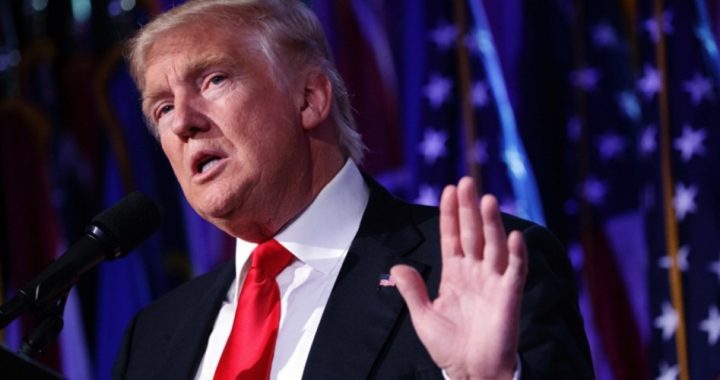
With the election Tuesday of Donald J. Trump as the 45th president of the United States, many are hoping that the first non-politician, non-veteran to occupy the Oval Office will bring a fresh approach to his administration, one more committed to complying to the Constitution’s limits on executive power.
President-elect Trump may indeed turn out to be faithful to his oath of office, breaking the tradition of so many generations of his predecessors.
So many of those who sat in the seat he will soon occupy, violated their oaths and the limits on their power imposed by the states when they ratified the Constitution. They used presidential directives, executive orders, and signing statements to legislate, consolidating immense power in the presidency, power never meant to be wielded by one man.
In an article published November 11 by the Foundation for Economic Education, Trevor Burris explains the Founders’ intent in creating the office of president and the limits they purposefully placed on the power that position would be granted:
Constitutionally limited government exists to protect the freedom of the citizens from the vicissitudes of democratic rule. The Framers of the Constitution knew that a person of George Washington’s caliber would not always be chosen president. They knew about demagoguery and populism. James Madison, in particular, was terrified of how voters in states could be swept up in waves of populist fury and, in the process, enact policies damaging to the long-term prosperity and freedom of the people.
These limits, however, have not been heeded for many years now, and our Constitution is often treated by presidents as little more than a relic. That document’s enumeration of “all legislative power” to the Congress is treated as no more than a suggestion — certainly not as a real restriction.
As Burrus, a research fellow at the Cato Institute’s Center for Constitutional Studies, writes, “Unfortunately, after a century or more of erosion, our Constitution doesn’t limit our government the way it once did. In particular, the president is incredibly powerful, and able to make significant decisions without proper checks and balances.”
The existence of these documents — executive orders, signing statements, and presidential directives — represent a corpus of presidential fiats masquerading as laws. As demonstrated in the history of these proclamations, for generations presidents have carried out a plan to consolidate all functions of government into the hands of one “unitary” executive, aggrandizing the office of the president and reducing Congress to mere plaintiffs in lawsuits challenging that all but unlimited authority.
It would do well for Americans concerned about this consolidation to study the words and warnings of our Founding Fathers and their political and philosophical influences regarding the primacy of the separation of powers in a good government.
James Madison, writing as “Publius,” stated in The Federalist, No. 47: “The accumulation of all powers legislative, executive and judiciary in the same hands, whether of one, a few or many, and whether hereditary, self appointed, or elective, may justly be pronounced the very definition of tyranny. “
Madison himself was restating in his inimitable style, one facet of federalism that was universally considered to be an essential pillar of liberty.
As the venerable French philosopher Baron de Montesquieu wrote in his influential treatise l’Esprit des Lois (The Spirit of the Laws), “When the legislative and executive powers are united in the same person, or in the same body of magistrates, there can be no liberty; because apprehensions may arise, lest the same monarch or senate should enact tyrannical laws, to execute them in a tyrannical manner.”
“Centinel,” the nom de guerre of an anti-Federalist opposed to ratifying the new Constitution, rephrased for his readers what was already, in the 18th century, a well-settled aspect of good government, “This mixture of the legislative and executive moreover highly tends to corruption. The chief improvement in government, in modern times, has been the complete separation of the great distinctions of power; placing the legislative in different hands from those which hold the executive.”
Another anonymous anti-Federalist commented, “Liberty therefore can only subsist, where the powers of government are properly divided, and where the different jurisdictions are inviolably kept distinct and separate.”
The words of these men are a worthy indicator of the provenance of one of the most potent threats of despotism: the executive branch.
Many of Trump’s predecessors have filled the shoes of a tyrant heel to toe. One after the other, presidents bent on aggrandizing the executive office have demolished the walls of history, law, and constitutional enumerations that separate the executive and legislative powers.
With a genuine novus homo on his way to the White House, there is hope that the walls separating the three branches of the federal government will be rebuilt and that the 45th president will willingly contain his actions within the boundaries placed around his authority in the Constitution.
What is certain, however, is that without the necessary vigilance, Americans will be generally unaware of any usurpations. Most of us will carry on being obsessed with the food and games that have fascinated the formerly self-governing since the days of ancient Rome.
Aside from the mechanisms included in the Constitution by the Framers, the best check on the expansion of executive power is the people of the United States. We would be wise to follow the counsel given to us by the third man to hold the office of president, Thomas Jefferson.
“In questions of powers, then, let no more be heard of confidence in man, but bind him down from mischief by the chains of the Constitution,” Jefferson said.
As Donald Trump transitions from businessman to president, the American people must transition from casual bystanders to engaged sovereigns, always watching those elected to serve us, making sure that the federal beast stays inside its constitutional cage.
Photo of Donald Trump: AP Images



